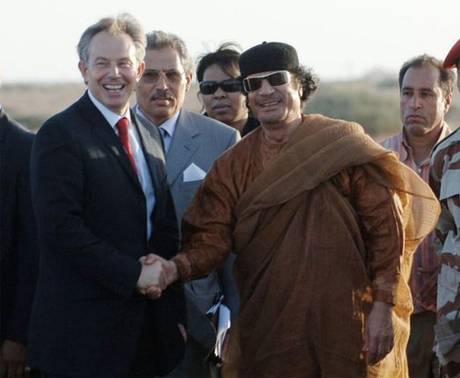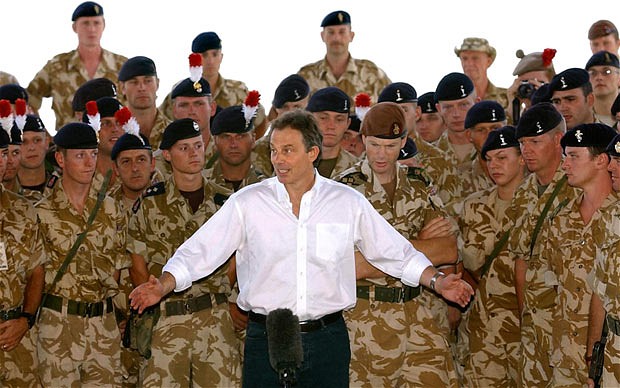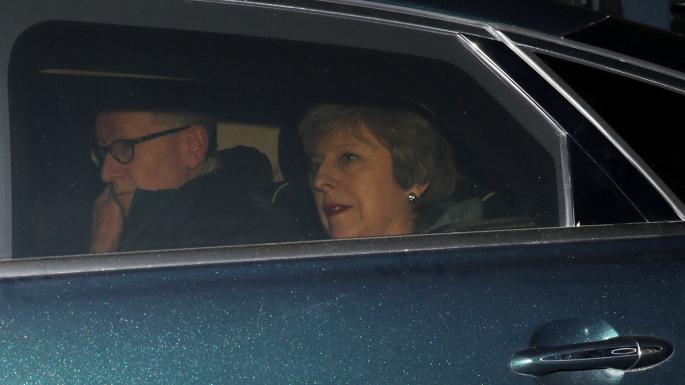From Visions of a Young Country to Mouldy Jam
 It was only 1995 when Tony Blair described Britain as: ” a nation for all the people, built by all the people. Old divisions cast out. A new spirit in the nation …” – then slipping to into the strange non-language he patented he concluded: “Working together. Unity. Solidarity. Partnership.”
It was only 1995 when Tony Blair described Britain as: ” a nation for all the people, built by all the people. Old divisions cast out. A new spirit in the nation …” – then slipping to into the strange non-language he patented he concluded: “Working together. Unity. Solidarity. Partnership.”
Revisiting the traces of Blair’s disastrous rule tells us much about the collapse of Britain in a short twenty-five year period and the long decline in a short time-span to the present abyss. The rhetoric is banal, empty and hypocritical, but it is a snapshot on the death of the idea of Britain. Twenty four years ago it was possible for a British politician to talk in these terms:
“For our generation and our time, Labour must exist not only to defend the gains of the past but to forge a new future for itself and our country.”
“Our job is to honour the past but not to live in it.”
“Britain stands at a crossroads…Our challenge is to forge a new and radical politics for a new and changing world.”
“It’s no good waving the fabric of our flag when you have spent 16 years tearing apart the fabric of our nation'”.
These words that seem darkly comic in light of the Brexit hysteria. And yet in a line that could be spoken by Corbyn he said:
“To anyone thinking of grabbing our railways . . . so they can make a quick profit as our network is broken up and sold off, I say this – there will be a publicly owned and publicly accountable railway system under a Labour government.”
In 1995 Blair argued that we should “make this the young country of my generation’s dreams”. In 1995 it was possible to attempt to project Britain forward; by 2014 this was implausible; by 2016 it was unimaginable; by 2019 it is laughable.
 Of course it’s pre-Obama, pre-Diana powder-puff pure rhetoric. It’s YBA Noel Gallagher drivel: regurgitated sub-JFK Mandelsonian spin, but the idea that it could be swallowed is extraordinary given the rolling psychological pantomime of Brexit. If Britain could then be portrayed or imagined as a “young country” it can today only be perceived as a country struggling with the paperwork on the way to Dignitas.
Of course it’s pre-Obama, pre-Diana powder-puff pure rhetoric. It’s YBA Noel Gallagher drivel: regurgitated sub-JFK Mandelsonian spin, but the idea that it could be swallowed is extraordinary given the rolling psychological pantomime of Brexit. If Britain could then be portrayed or imagined as a “young country” it can today only be perceived as a country struggling with the paperwork on the way to Dignitas.
From sunlit uplands to mouldy jam in the space of a few months, Brexit is like a whole life compressed into a two-year period with all the joy removed and replaced by incompetent salivating nationalists and a voice in your head whispering “Nothing has changed” whilst the media loops faster and faster about less and less.
Only two years after Blair’s famous speech Robin Cook declared: “Labour does not accept that political values can be left behind when we check in our passports.”
“Our foreign policy must have an ethical dimension, and must support the demands of other peoples for the democratic rights on which we insist for ourselves.”
Now – 24 years on from Blair’s speeches – after Iraq, after 9/11 – we are left with Gavin Williamson talking about our “lethality” as if Iraq and our series of foreign policy disasters never happened. This week Williamson talked of attacking nations who “flout international law”, backed up by new military technologies and capabilities and faced widespread incredulity and derision.
If austerity and regional inequality are the bedrock of Brexit, so too are the foreign policy disasters laid-out by New Labour from which Britain has never recovered. If Suez was a marker for imperial decline, Iraq and post-Iraq mayhem was a sign of loss of international credibility. Britain went from Robin Cook to Gavin Williamson in a quarter of a century.
If Blair’s 1995 speech was high on ethereal rhetoric and visioning, Cook’s speech was detailed but also bold.
Two sections are worth quoting in full:
 “Our foreign policy must have an ethical dimension and must support the demands of other peoples for the democratic rights on which we insist for ourselves. The Labour Government will put human rights at the heart of our foreign policy and will publish an annual report on our work in promoting human rights abroad. The next twelve months provide the greatest opportunities in a generation for Britain to take a leading part on the world stage. At next month’s IGC we will work for agreement while resolutely defending British interests. In January, Britain takes over the Presidency of the European Union. Unlike the previous Conservative administration, Labour can offer a Government with a secure majority at Westminster and a strong leader in Downing Street, able to seize the opportunity to shape the direction of Europe. Our two main objectives for the British Presidency will be to remove the remaining barriers to trade within the single market and to get talks on enlargement off to a flying start. In October, Britain hosts the biennial Commonwealth Heads of Government Meeting. Last time in New Zealand the Conservative Government was isolated over its support for the French nuclear tests. This time a Labour Government will be in the driving seat, steering towards increased global trade and investment between Commonwealth members and good government on the basis of the Harare Declaration. In April Britain will host the Europe/Asia Summit. The Labour Government will work for enhanced dialogue and specific measures of cooperation, including on trade, investment and technology transfer. This cluster of opportunities for Britain to provide leadership will make the next year a uniquely exciting and rewarding period in foreign affairs.”
“Our foreign policy must have an ethical dimension and must support the demands of other peoples for the democratic rights on which we insist for ourselves. The Labour Government will put human rights at the heart of our foreign policy and will publish an annual report on our work in promoting human rights abroad. The next twelve months provide the greatest opportunities in a generation for Britain to take a leading part on the world stage. At next month’s IGC we will work for agreement while resolutely defending British interests. In January, Britain takes over the Presidency of the European Union. Unlike the previous Conservative administration, Labour can offer a Government with a secure majority at Westminster and a strong leader in Downing Street, able to seize the opportunity to shape the direction of Europe. Our two main objectives for the British Presidency will be to remove the remaining barriers to trade within the single market and to get talks on enlargement off to a flying start. In October, Britain hosts the biennial Commonwealth Heads of Government Meeting. Last time in New Zealand the Conservative Government was isolated over its support for the French nuclear tests. This time a Labour Government will be in the driving seat, steering towards increased global trade and investment between Commonwealth members and good government on the basis of the Harare Declaration. In April Britain will host the Europe/Asia Summit. The Labour Government will work for enhanced dialogue and specific measures of cooperation, including on trade, investment and technology transfer. This cluster of opportunities for Britain to provide leadership will make the next year a uniquely exciting and rewarding period in foreign affairs.”
Such objectives and confidence is unthinkable today.
It’s worth noting too that – in terms of the idea and the optics of a functioning Union – the idea of Scottish politicians holding high office is now also virtually unthinkable.
The ethical dimension of Cook’s vision was explicit as was his commitment to communication and team-building:
“Today’s Mission Statement sets out new directions in foreign policy. It makes the business of the Foreign and Commonwealth Office delivery of a long-term strategy, not just managing crisis intervention. It supplies an ethical content to foreign policy and recognises that the national interest cannot be defined only by narrow realpolitik. It aims to make Britain a leading partner in a world community of nations, and reverses the Tory trend towards not so splendid isolation. We are setting a new direction for the Foreign and Commonwealth Office under the new team of Ministers with me here today. But this is not just a Mission Statement for Ministers. It is a work programme for every diplomat abroad and all staff in this building. As part of a more open, inclusive approach to management, I personally will be communicating our Mission Statement to staff. On Friday, I will meet in this room with representatives of all departments and all grades to explain our Mission Statement to them. Within the next two weeks we will be sending to each of more than two hundred foreign posts a video prepared with the help of David Puttnam in which I will speak directly to them of our new goals and our new direction. My message to all staff is that Ministers need their professionalism, expertise and dedication if we are to achieve our aims and measure up to our benchmarks. I invite them today to work together with us in a joint project to make Britain once again a force for good in the world.”
Of course Cook’s vision was broken by Blair’s ideology and the British State’s DNA. He would resign, followed shortly by Clare Short in 2003 saying: “I cannot support a war without international agreement or domestic support” criticising the government for proceeding with the war, despite failing to win a second resolution from the UN Security Council. He argued that : “None of us can predict the death toll of civilians from the forthcoming bombardment of Iraq, but the US warning of a bombing campaign that will ‘shock and awe’ makes it likely that casualties will be numbered at least in the thousands.”
 This is not to be dewy-eyed about 90s Britain or Labour, but to remind ourselves, amongst the chaos, that only recently a British government with popular support was taking in terms of ethics and leadership. The Chilcot Report proved Cook right in every respect, and the fallout from the Iraq disaster would inspire and radicalise a generation in Scotland and beyond, as the idea of Britain as a progressive force collapsed and gave way to successive Conservative governments, now unburdened by their previous patrician airs and graces.
This is not to be dewy-eyed about 90s Britain or Labour, but to remind ourselves, amongst the chaos, that only recently a British government with popular support was taking in terms of ethics and leadership. The Chilcot Report proved Cook right in every respect, and the fallout from the Iraq disaster would inspire and radicalise a generation in Scotland and beyond, as the idea of Britain as a progressive force collapsed and gave way to successive Conservative governments, now unburdened by their previous patrician airs and graces.
Assessing the foreign policy of New Labour Tony Wood writes:
“Viewed in international context, what have been the salient characteristics of New Labour’s period in office? Firstly, its duration: part of a wave of Third Way governments that came to power in the 90s, Labour has outlived them all. Secondly, its whole-hearted embrace of the free market, far more open and enthusiastic than those of its European analogues. Most distinctive, however, has been its integral role in Washington’s serial military aggressions: Labour’s Atlanticism has exceeded not only that of Germany’s spd, which backed the assaults on Kosovo and Afghanistan but baulked at Iraq, but also governments of the centre-right in France, Italy, Spain. Finally, New Labour has led the way on torture and repression within the European Union—above all since 2001, when the reverberations of its own foreign policy began coursing back through the domestic scene.”
He continues:
“If, in global perspective, New Labour’s zealous warmongering has been its most distinctive characteristic, it also marks the clearest break—for the worse—from its Tory predecessors. For the most part, the Major governments pursued a conventional Atlanticist foreign policy, participating in the first Gulf War without demurral and joining the us in launching airstrikes on Iraq in 1996 (cheered on by Blair from the opposition benches). But relations with the Clinton administration were cool: Foreign Secretaries Hurd and Rifkind both objected to the us intensification of war in Bosnia and bombardment of Serb positions. From 1999 onwards, New Labour assumed a much more forward role. Not just a follower, Blair became an active advocate of us imperial aims: urging a reluctant Clinton to send ground troops into Kosovo, dispatching his own team of spin-doctors to Brussels to run NATO’s communications during the bombing campaign. In April 1999 he presented Americans with the first theorization of neo-imperial ‘humanitarian’ warfare, the ‘doctrine of international community’—something that Clinton, preoccupied by the Lewinsky scandal, had been too busy to produce. After 9.11, Blair assumed the role of recruiting sergeant for Bush, flying 50,000 miles in eight weeks to drum up support for the assault on Afghanistan; the ‘coalition of the willing’, by which token troop deployments from some 40 states have been inflicted upon the long-suffering Afghans, largely owes its existence to New Labour. British secret services manfully assisted the Americans in torturing detainees, and raised no objections to UK citizens being disappeared to Guantánamo.”
“While Yugoslavia had been bombed on humanitarian grounds, and Afghanistan to get Osama, a different justification had to be found for the invasion of Iraq. Here again New Labour proved instrumental, helping to fabricate evidence even less credible than that supplied by the US — and then, when doubts about Iraqi WMD were aired on a BBC radio programme, sacking the BBC Chairman and Director-General. Circumstances surrounding the death of the chemical-weapons expert who had spoken to the BBC, David Kelly, remain obscure. When not militarily engaged on its own account, New Labour has been an obliging apologist for others’ wars. Blair began his term selling weapons for Indonesia to use against Aceh, and was fulsome in his praise for Putin during the devastation of Chechnya. In 2006, Labour offered unconditional support for Israel’s attack on Lebanon. When Israeli Foreign Minister Tzipi Livni faced being charged for her role in this criminal war if she set foot on British soil, Foreign Secretary David Miliband reassured Tel Aviv that the UK would amend its inconsiderate laws. Blair’s appointment as the Quartet’s special envoy to the Middle East only added bureaucratic insult to a decade of human injury.”
So much for the ethical foreign policy.
If Blair’s words “It’s no good waving the fabric of our flag when you have spent 16 years tearing apart the fabric of our nation” echo down the years – a truth lost in the carnage – Scotland should learn one thing from Blair, the need to look forward not back, the need to envisage Scotland facing the challenges of today as Anglo-Britain wraps itself in the warm-embrace of wartime nostalgia.
Paraphrasing Blair, Scotland stands at a crossroads…Our challenge is to forge a new and radical politics for a new and changing world.

.
Williamson has some cheek talking about countries who ‘flout international law’ when the UK is breaking the terms of the Good Friday y Agreement.
Secondly, given the English Votes for English Laws dictum by David Cameron, I assume that MPs from Unionist parties are quite happy that they will never attain ministerial office under that regime. What pathetic lack of ambition. Do they not realise that they are destined to be forever pawns of the Central Party Office in London. Mere voting fodder.
“the idea of Scottish politicians holding high office is now…virtually unthinkable.”
Heard this argument plenty around the time of our referendum in 2014. Didn’t by it then, and don’t now. Michael Gove, for example, is Scottish. He prefers to think of himself as British, is married to an English woman (a professional Scot-hater), they have English kids. He could easily be PM one day. Brit-Nat Scots are arguably best placed to rise in the Tory Party nowadays. Agree that England may never again accept a Scottish Labour leader/PM. That said, England may never again elect a Labour government, period.
Gove is only nominally Scottish. What I meant was we have moved from a space where a whole number of Scots were part of a government to where that would simply be culturally and politically impossible.
Earl of Bute – Lord Aberdeen – Lord Rosebery – Arthur Balfour – Ramsay MacDonald – Alec Douglas-Home – Gordon Brown – they all disappointed as Prime Ministers. Michael Gove seems a suitable book-end to that lacklustre list.
I remember, one very hungover New Year’s day in the late 90s, when I was 18yo, going for an afternoon “cure” in the Tron pub, in Edinburgh, and noticing Robin Cook, with a friend, having a pint at the table next me and my pals. Although I knew very little about politics, I knew enough to recognise him and was struck by a straightforward and down to earth feel to him. That random passing has really stuck with me over the years. I believe he was a good man. How different things could have been if men like Robin were pulling the strings. Thanks for an interesting article.
Absolutely smashing read. Sometimes an article just hits you and that one really did. All the hope of new labour totally turned sour. They had 13 years but it felt like it turned quicker. I say to English people that after that a good number of Scots couldn’t vote labour ever again and so looked for an alternative and maybe like me wasn’t convinced of Indy voted SNP as I could never vote Tory, I guess that’s why a lot turned to UKIP down south, the coalition killed the lib Dems so who was their alternative. I remember being really moved that labour delivered our parliament until I got wise enough to know they tied it up in knots. Never a better phrase said labour, Tory two cheeks of the same arse
Thanks Kenny.
Michael Gove was born in Scotland to a Scottish mother, raised in Scotland by Scottish adoptive parents, educated in Scotland under the Scottish system, lived and worked in Scotland for several years… You prefer to think of him as ‘only nominally’ Scottish, Mike; Gove would probably agree. But he is SCOTTISH. What happens to folk like Gove after Scottish independence? Do they move south and become ‘only nominally’ Scottish? Are high-profile Irish people living and working in England ‘only nominally’ Irish?